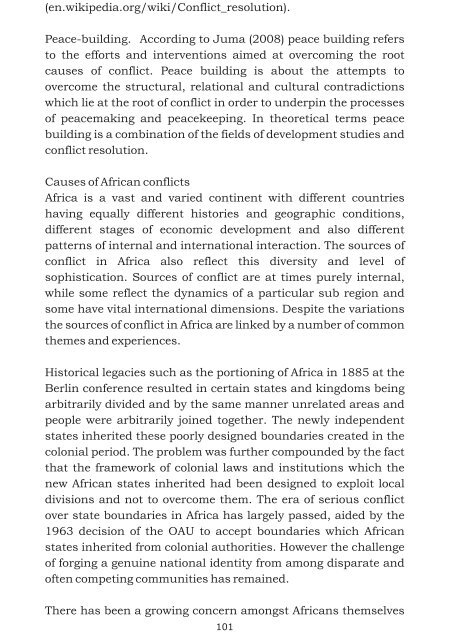Beneficiaries are actors too.pdf - Southern Institute of Peace ...
Beneficiaries are actors too.pdf - Southern Institute of Peace ...
Beneficiaries are actors too.pdf - Southern Institute of Peace ...
Create successful ePaper yourself
Turn your PDF publications into a flip-book with our unique Google optimized e-Paper software.
(en.wikipedia.org/wiki/Conflict_resolution).<br />
<strong>Peace</strong>-building. According to Juma (2008) peace building refers<br />
to the efforts and interventions aimed at overcoming the root<br />
causes <strong>of</strong> conflict. <strong>Peace</strong> building is about the attempts to<br />
overcome the structural, relational and cultural contradictions<br />
which lie at the root <strong>of</strong> conflict in order to underpin the processes<br />
<strong>of</strong> peacemaking and peacekeeping. In theoretical terms peace<br />
building is a combination <strong>of</strong> the fields <strong>of</strong> development studies and<br />
conflict resolution.<br />
Causes <strong>of</strong> African conflicts<br />
Africa is a vast and varied continent with different countries<br />
having equally different histories and geographic conditions,<br />
different stages <strong>of</strong> economic development and also different<br />
patterns <strong>of</strong> internal and international interaction. The sources <strong>of</strong><br />
conflict in Africa also reflect this diversity and level <strong>of</strong><br />
sophistication. Sources <strong>of</strong> conflict <strong>are</strong> at times purely internal,<br />
while some reflect the dynamics <strong>of</strong> a particular sub region and<br />
some have vital international dimensions. Despite the variations<br />
the sources <strong>of</strong> conflict in Africa <strong>are</strong> linked by a number <strong>of</strong> common<br />
themes and experiences.<br />
Historical legacies such as the portioning <strong>of</strong> Africa in 1885 at the<br />
Berlin conference resulted in certain states and kingdoms being<br />
arbitrarily divided and by the same manner unrelated <strong>are</strong>as and<br />
people were arbitrarily joined together. The newly independent<br />
states inherited these poorly designed boundaries created in the<br />
colonial period. The problem was further compounded by the fact<br />
that the framework <strong>of</strong> colonial laws and institutions which the<br />
new African states inherited had been designed to exploit local<br />
divisions and not to overcome them. The era <strong>of</strong> serious conflict<br />
over state boundaries in Africa has largely passed, aided by the<br />
1963 decision <strong>of</strong> the OAU to accept boundaries which African<br />
states inherited from colonial authorities. However the challenge<br />
<strong>of</strong> forging a genuine national identity from among disparate and<br />
<strong>of</strong>ten competing communities has remained.<br />
There has been a growing concern amongst Africans themselves<br />
101


